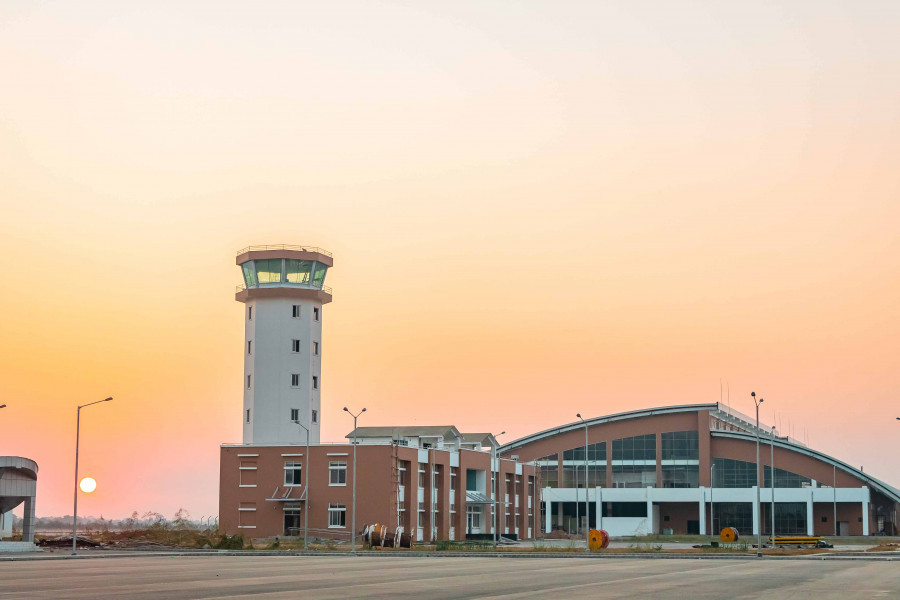Money
Technical testing at Bhairahawa airport slated to begin in mid-February
During the calibration flights, a special aircraft will check the accuracy of navigation signals required for safe take-off and landing.
Sangam Prasain
Technicians are slated to begin testing the newly-installed communication and navigation equipment at Bhairahawa's upcoming international airport from mid-February, airport officials said.
Located in the central Tarai, the Rs6.22 billion facility has been named Gautam Buddha International Airport. The airport is the gateway to the international pilgrimage destination of Lumbini, the birthplace of Gautam Buddha. It has a 3,000-metre-long and 45-metre-wide runway.
All new airports have to undergo flight inspection, including tryouts of all infrastructure before they can enter service. These inspections are done in flight by using flight inspection aircraft to analyse and assess the performance and efficiency of the aids to ensure the safety of aircraft that rely on them for navigation and landing guidance.
During the calibration flights, a specially equipped calibration aircraft will check the accuracy of the transmitted navigation signals required for safe take-off and landing.
Engineer Pravin Neupane, who is overseeing the communication and navigation component of the project, said testing of all equipment, including the newly-installed communication and navigation aids, also known as calibration flights, would begin within February 15 to 20.
Technicians say that based on weather conditions, it may take at least 40 flying hours to complete the calibration of the new airport that will be done with a special aircraft flying at an altitude of 40,000 feet. A twin-turboprop Beechcraft is usually used for this task.
“A four-member team of technicians from the Thai government-owned company Aeronautical Radio of Thailand is currently in Nepal to check all the ground systems,” said Neupane. “They started their work on Wednesday.”
According to project officials, all systems, including power, will be switched on 24/7 from Sunday to check the reliability of the systems. “It may continue for two weeks,” said Neupane.
The installation of all equipment has been completed at Nepal’s second international airport.
On March 7, 2019, Aeronautical Radio of Thailand was awarded a $4.83 million contract for the supply, delivery, installation and commissioning of Communication, Navigation and Surveillance/Air Traffic Management, including meteorological equipment and other related services, at Gautam Buddha International Airport. The project was planned to be completed in 2019.
Despite the Covid situation, the Thai company completed the installation of the navigation and communication equipment in August 2021, but informed the airport project that they would begin the calibration and testing of the equipment only after the Covid-19 situation in Nepal receded to almost zero. The final phase of the project was then halted.
On November 20 last year, a senior representative of the Thai company arrived in Nepal to assess the situation.
The project was expected to complete all tasks, including tests and calibration of the communication and navigation equipment, by October last year; but the second wave of the coronavirus which started in mid-April upset its revised timetable.
In May last year, the coronavirus positivity rate had reached 45 percent, with nearly 9,000 new cases appearing daily, an increase of about 3,000 percent from April.
Following the Thai company’s reluctance to come to Nepal fearing Covid, the Civil Aviation Authority of Nepal approached the South Korean and Indian governments and the Federal Aviation Administration (FAA) of the United States to conduct the tests, but only India responded positively.
The FAA, an agency of the US government responsible for the regulation of aircraft and airports, had conducted flight inspections of the radar system at Bhatte Danda in Lalitpur in 2017.
The civil aviation body then initiated a government-to-government deal with India because it was difficult to bring foreign experts under the coronavirus circumstances, and that could delay tests at the new airport including periodic checks at other airports in Nepal.
Nepal had asked the Airports Authority of India to provide periodic airport and flight inspection services for its airports. Nepal had proposed signing a three-year contract with India.
But officials found that would not be necessary as the Thai company eventually came forward to do it. According to a senior official at the Civil Aviation Authority, they had dispatched a formal letter to the Thai company, informing it of a breach in the agreement.
The company then responded that it was ready to complete the work as Thailand had ended its own corona restrictions and reopened on November 1 last year, a few days after the letter was dispatched.




 20.12°C Kathmandu
20.12°C Kathmandu














